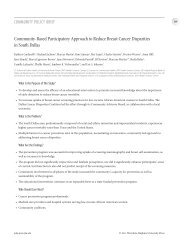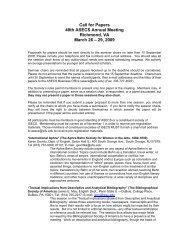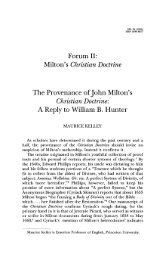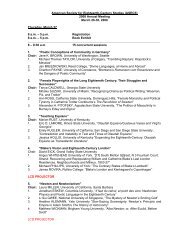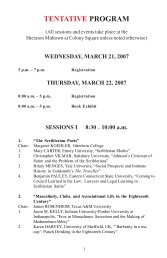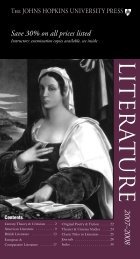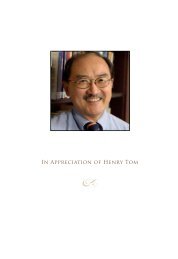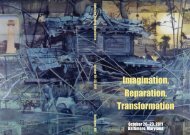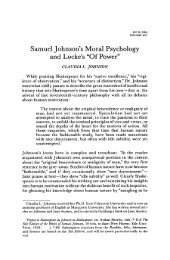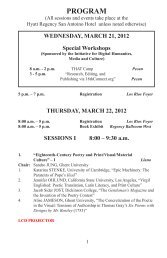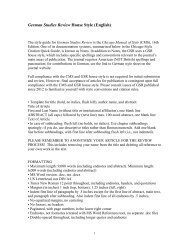Fall 2008 - The Johns Hopkins University Press
Fall 2008 - The Johns Hopkins University Press
Fall 2008 - The Johns Hopkins University Press
Create successful ePaper yourself
Turn your PDF publications into a flip-book with our unique Google optimized e-Paper software.
Horse Trading in the Ageof CarsMen in the MarketplaceSteven M. Gelber<strong>The</strong> trading, selling, and buyingof personal transport haschanged little over the pastone hundred years. Whetherhorse trading in the earlytwentieth century or carbuying today, haggling overprices has been the commonpractice of buyers andsellers alike.Steven M. Gelber convincinglydemonstrates that thecombative and frequentlydishonest culture of theshowroom floor is a historicalartifact whose origins lie in the history of horse trading.Bartering and bargaining were the norm in this predominantlymale transaction, with both buyers and sellers stakingtheir reputations and pride on their ability to negotiate thebetter deal. Gelber comments on this point-of-sale behaviorand what it reveals about American men.Gelber’s highly readable and lively prose makes clear how thisunique economic ritual survived into the industrial twentiethcentury, in the process adding a colorful and interestingchapter to the history of the automobile.“Combines a sophisticated history of horse trading and car dealingwith a critical analysis of the way both worked. A sterling exampleof the ways in which culture and the human actors enmeshed in thatculture shape economic practice.”—Wendy Gamber, Indiana <strong>University</strong>Noble BrutesHow Eastern Horses Transformed English CultureDonna Landry“His lordship’s Arabian,” a phrase often heard in eighteenthcenturyEngland, described a new kind of horse importedinto the British Isles from the Ottoman Empire and theBarbary States of North Africa. Noble Brutes traces how theintroduction of these Eastern blood horses transformed earlymodern culture and revolutionized England’s racing andequestrian tradition.More than two hundred Oriental horses were imported intothe British Isles between 1650 and 1750. With the horsescame Eastern ideas about horsemanship and the relationshipbetween horses and humans. Landry’s groundbreakingarchival research reveals how these Eastern imports profoundlyinfluenced riding and racing styles, as well as literatureand sporting art.After only a generation of crossbreeding on British soil, theEnglish Thoroughbred was born, and with it the gentlemanlyideal of free forward movement over a country as anenactment of English liberties.This radical reinterpretation of Ottoman and Arab influenceson horsemanship and breeding sheds new light onEnglish national identity, as illustrated in such classic worksas Jonathan Swift’s Gulliver’s Travels and George Stubbs’s portraitof Whistlejacket.Donna Landry is a professor of English at the <strong>University</strong> ofKent and author of <strong>The</strong> Invention of the Countryside: Hunting,Walking, and Ecology in English Literature, 1671–1831 and <strong>The</strong>Muses of Resistance: Laboring-Class Women’s Poetry in Britain,1739–1796.Animals, History, CultureHarriet Ritvo, Series EditorSteven M. GelBER is a professor of history at Santa Clara<strong>University</strong> and author of Hobbies: Productive Leisure and theCulture of Work in America.Gender Relations in the American ExperienceJoan E. Cashin and Ronald G. Walters, Series EditorsOctober 256 pages 6 x 9 7 halftones978-0-8018-8997-4 0-8018-8997-9 $50.00(s) / £27.00 hcAmerican HistoryJanuary 272 pages 6 x 9 12 halftones978-0-8018-9028-4 0-8018-9028-4 $50.00(s) / £27.00 hcBritish HistoryTHE JOHNS HOPKINS UNIVERSITY PRESS www.press.jhu.edu 40



